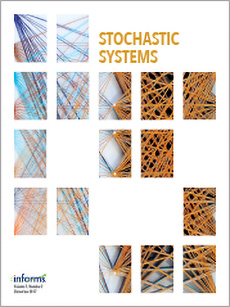Abstract
In multi-class communication networks, traffic surges due to one class of users can significantly degrade the performance for other classes. During these transient periods, it is thus of crucial importance to implement priority mechanisms that conserve the quality of service experienced by the affected classes, while ensuring that the temporarily unstable class is not entirely neglected. In this paper, we examine the complex interaction occurring between several classes of traffic when classes obtain bandwidth proportionally to their incoming traffic. We characterize the evolution of the performance measures of the network from the moment the initial surge takes place until the system reaches its equilibrium. Using a time-space-transition-scaling, we show that the trajectories of the temporarily unstable class can be described by a differential equation, while those of the stable classes retain their stochastic nature. In particular, we show that the temporarily unstable class evolves at a time-scale which is much slower than that of the stable classes. Although the time-scales decouple, the dynamics of the temporarily unstable and the stable classes continue to influence one another. We further proceed to characterize the obtained differential equations for several simple network examples. In particular, the macroscopic asymptotic behavior of the unstable class allows us to gain important qualitative insights on how the bandwidth allocation affects performance. We illustrate these results on several toy examples and we finally build a penalization rule using these results for a network integrating streaming and surging elastic traffic.
Citation
Mathieu Feuillet. Matthieu Jonckheere. Balakrishna Prabhu. "Bandwidth sharing networks with multiscale traffic." Stoch. Syst. 4 (2) 449 - 478, 2014. https://doi.org/10.1214/11-SSY053
Information





